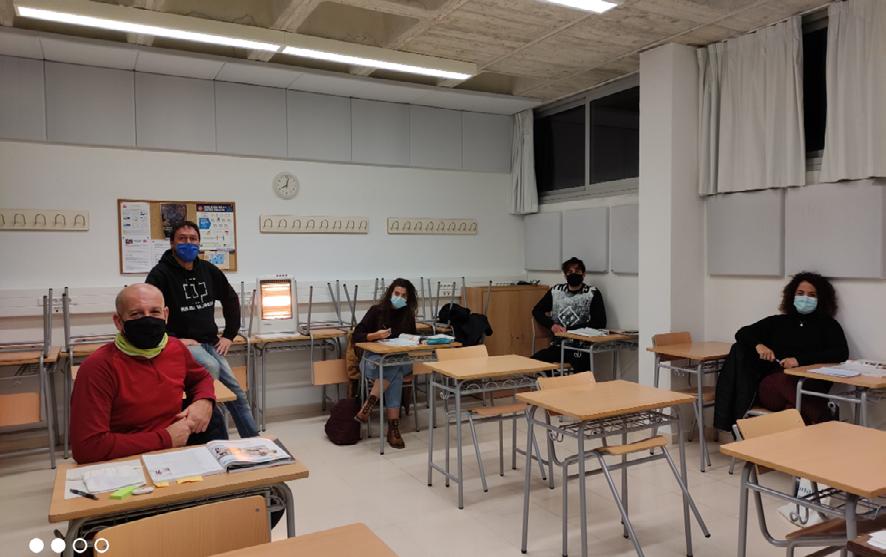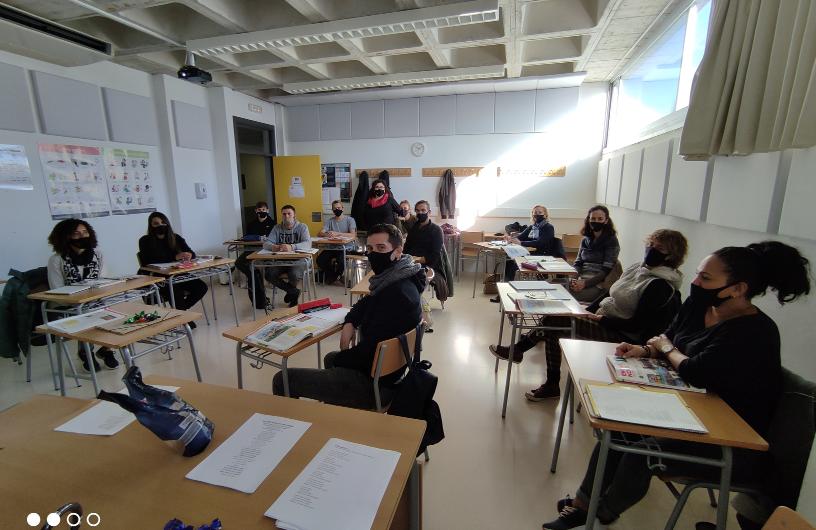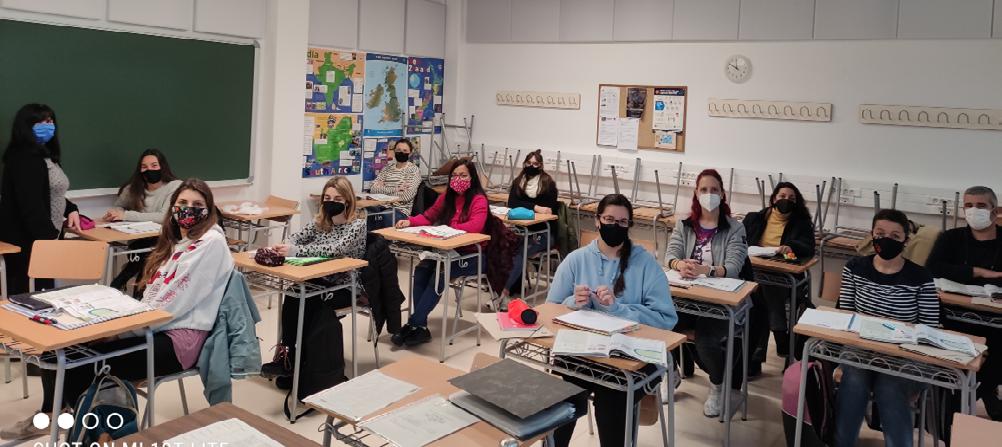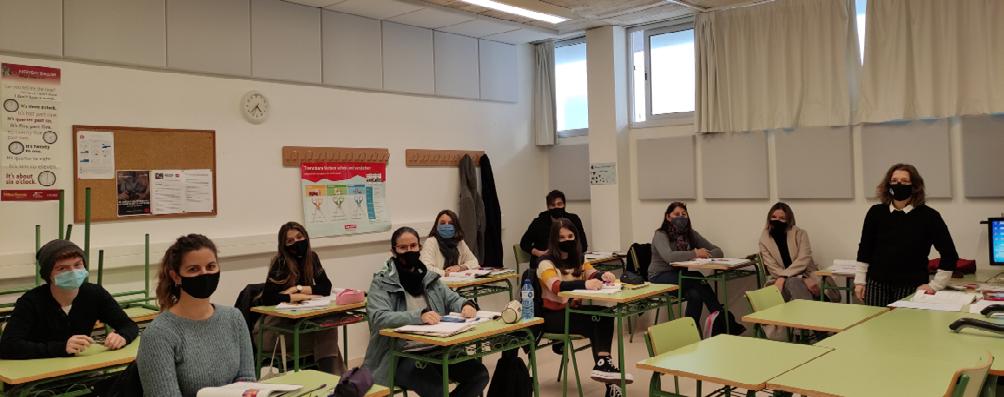
11 minute read
L’église de Sant Francesc, construite au XVIIe siècle
from Guaita! Nº6
ENTREVISTES
Manel Triay
Advertisement
Manel Triay, a student of English B2.1 A, tells us about his experience of living in the United Kingdom. He left the island in 2013 at the age of 25, when he decided to start a new adventure. He lived in Stratford-upon-Avon, William Shakespeare’s birthplace.
Why did you decide to move there?
I mainly decided to move to the UK due to the bad economic situation we were going through in our country. It wasn’t easy to find a job here, I wanted to work to keep having a good lifestyle, and I saw that it would not be possible if I stayed in Menorca, so I didn’t doubt too much before making the decision to get out from the island and go to England to start a new adventure. I also left Menorca because it was a good chance for me to learn English properly.
What was your first impression when you arrived in the UK?
My first impression when I got there was that I would miss the weather we have and enjoy here in Spain. I went there in January, in the middle of the winter. The day I arrived it was snowing, the temperature was really low, so I felt completely frozen. I can say that I had never been so cold before. Despite that, I knew that I had to get used to it - because I didn’t go there for only a few days - I was going to stay in the UK for a long time, so I had no other choice but to get used to that environment as soon as possible.
What was the hardest thing for you to get used to? Did you feel accepted by the locals?
I’ve just mentioned before, getting used to the British weather was one of the main things I had to face. But of all the things that I had to get used to, the first one, without question, was the language, because when I went to England for the first time, my knowledge of English was, honestly, very poor. I couldn’t speak the language very well, and my understanding wasn’t too good either. So it was hard at the beginning. About whether I felt accepted by the locals, I could say yes, more or less. British people, in my opinion, aren’t as open as the Spanish are, but I can’t say I was received badly by them whatsoever. You can always find some exceptions of locals who don’t like foreigners too much, but in general, I was fairly accepted. A few years later, when the ``Brexit story´´ began, I have to say that the situation changed a little, I met more people who didn’t like the outsiders. Perhaps before that, some of them didn’t feel free enough to admit their hostility to foreigners, and with the Brexit situation, they felt freer to express this awful attitude. Luckily, that was a minority.
Did you find it difficult to learn the language? What did you do to learn it? (School, Academy, Private Lessons, etc.) Yes, I did. As I’ve just said, it was quite difficult at the beginning, I struggled a lot to learn it in the best way. My English level wasn’t very good, so I needed some time to learn the language. It takes years to learn a language correctly. When I arrived there, I went to a private school for almost two months, I learnt as much as I could. If I
“Düfte sind die Gefühle der Blumen” Heinrich Heine
had had more money I would have liked to study longer in that school, but it was very expensive and it was out of my budget. When I finished school I started to work and what I’ve learnt since then, I’ve learnt it by myself, watching TV, series, movies, and videos.
Did you make friends? Are you still in touch with them?
Yes, I did make friends, although almost all of them were Spanish. But nowadays I’m only in touch with a few of them, some of the people who I really got attached to. Nevertheless, over time, we sadly lost contact with some of the others. I met many people during the years I lived there, I had many mates, but like real friends not so many. Anyway, I still keep awesome memories of all the people I shared nice experiences and good times with.
What jobs did you do there? Did you find it hard to get into the labour world?
I worked as a waiter in a restaurant. That was my first job in the UK. After that job, I changed and I worked as a night porter and a gardener. I always worked at the same place, which is a hotel located in the countryside in the Midlands of England. It was hard for me when I worked as a waiter at my first job. I had never worked in a restaurant, so everything was new for me. Besides, I had the added problem that my English wasn’t too good yet at that time. But like many other things, I finally got used to it. Anyway, I have to say that I never liked that job, so I did not last long working there as a waiter. When I changed jobs and began working as a gardener, the story was absolutely different. That was a job which I really liked and enjoyed doing. The same as a night porter, I liked that job pretty much.
How different is it to learn a new language in the country where it is used compared to learning it here?
I think it is different, but it depends on how you learn it. In my case, I’ve learnt to speak and listen quite well, because being there you’re all the time listening to the people talking. So you learn how to speak quite quickly, because you’re catching the words the other people say, and you repeat them, but more in an informal way. It doesn’t mean that the grammar is always correct, though. It’s the same when I watch TV, series, movies... I always use subtitles too, therefore I know what they say if sometimes I don’t understand some words. But as I’m telling you, it isn’t 100% well-spoken English, the grammar has several broken rules. When I learn English here in Spain, I go to a school and I learn it well, in a formal way, using the grammar correctly. I might say the same about when I went to school in the UK, where I was taught to learn it in a formal way. But I was there only two months, a very short time to get involved suitably and learn the language formally. In my opinion, that’s the difference between learning the language here in a school and learning it there on your own, in your day-to-day life.
What advice would you give to someone who wants to learn English or any other foreign language?
I would recommend making short steps, going to a school first, trying to learn it as well as possible there, and once you’ve learnt the grammar rules and you’ve got a good level of that language, then you can move forward and start doing new stuff such as watching tv, read, write, listen in that language. You can read and watch TV from the beginning, whether your level is good or not, but from my own experience, it is better to go slowly, step by step with no rush, not to get confused and learn
it rightly.
How would you summarize your experience there?
Frankly, I can say that it is one of the best things I’ve ever done in my entire life. Many times I’ve thought that I should have gone there before. I learnt a new language in depth, I lived and worked in a new place, I met new people and made new friends, hanging out and having fun. And quite importantly, I made money during those years there and I could save some to come back here, at home, and now have a relaxing life, even in these bad times we are living nowadays. I also do not discard going back to the United Kingdom at some point in the future, after the profitable experience I had there.

Tomeu Al·lès Pons
Professor del Departament d’Anglès
COL·LABORACIONS 5 steps to avoiding an argument
Does it sound familiar to you if I talk about someone with whom it’s impossible to have a conversation without starting a war? Well then, following these 5 amazing pieces of advice you will be able to succeed in any argument without fighting.
1 Never forget to stay calm. Usually, when people with different points of view, have a conversation it’s too easy to fly off the handle. So, instead of acting without control, try to think about something pleasant until you’re back in the right frame of mind.

2 Keep the talk in a low voice. People tend to speak louder in order to make their point stronger. Nevertheless, the rest of the people can feel attacked by this and, as a consequence, provoke a horrible end. Personally, I think that the louder you talk, the harsher the argument turns.
3 People like to be listened to, so it’s crucial to pay attention to what they say. If others feel valued by what they express the conversation will flow much smoothly. Also, it will help you in the future, since there won’t be any misunderstanding about what was said.
4 Explain your side of the story in detail to make it crystal clear. More often than not, people just hear one side of the events and, guess what, it’s usually your part the one that they don’t know. So don’t hesitate to explain everything to be understood as easily as possible.

5 Last but not least, try to find a solution together. If you feel like the conversation is stuck at a point, try to arrive to a neutral agreement in which everybody feels comfortable. Otherwise, you might have to stop the chat and find something to do together. Remember: friendship comes first! Shall we E-meet? Believe it or not, virtual meetings are now the most trending way to talk to your folks, family or workmates…The E-meeting has arrived to stay permanently with us. Have you met your friends through a screen yet? If not, you are late! Nowadays the relationships with your colleagues have evolved into virtual meetings, not only because of the pandemic situation but also because our life has technically been transformed. The sophistication of our gadgets at home, like smart speakers, domotics or our phones have developed a new way to talk, to see or to catch up with the others. Going to work or having have an appointment will never be the same. Unfortunately, this way of relating prevents us from touching, kissing or feeling the corporal expression,... I believe that some of you will be happy with that part of it (!), but if you have someone closer, such as a couple or a lover, perhaps you will miss it a lot. Let’s get ready for the new e-meeting. A new age has begun! Who could have imagined this situation only 15 years ago? Not many people could believe that this new way of meeting would be true, but here we are, talking, meeting, working, chatting online! I encourage you to organize your background better and your appearance to look cooler, because now you will have many spectators of your life. A new era has already started, let’s not depart from it. You’d better improve your skills on cameras, otherwise you might feel alone… The show has started and must go on… are you ready?
Roser Toledo
Anglès C1.1 “The world is like a book and the one who doesn’t travel just reads the first page” “You can, you should, and if you’re brave enough to start, you will.” Agustin of Hippo / Anglès, B2.2-A Stephen King
How Has The Internet
Revolutionised Personal Relationships?
Carme Fontestat
Anglès B2.2-A

FOTOMATÓN

Us presentem els vertaders protagonistes de la nostra Escola. Els nostres alumnes!


FRANCÈS A2-A




FRANCÈS A2-B



ALEMANY A1-A


ALEMANY A2-A




ANGLÈS B1-A ANGLÈS A1-A




